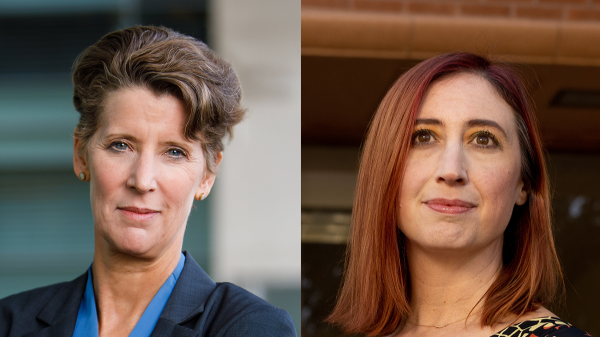ASU graduate Michael Esposito excelled in scientific research

Michael Esposito recently graduated from ASU with a bachelor's degree in biological sciences with a concentration in genetics, cell and developmental biology.
Editor's note: This story is part of a series of profiles of notable spring 2022 graduates.
As an undergraduate at Arizona State University, Michael Esposito partook of high-level research opportunities.
Esposito recently graduated from ASU with a bachelor’s degree in biological sciences with a concentration in genetics, cell and developmental biology and honors from Barrett, The Honors College. He was named this year’s Barrett Honors College Outstanding Student for Research.
He participated in the National Science Foundation (NSF) Research Experiences for Undergraduates (REU) program and led the machine-learning training of a team of two Sensor Signal & Information Processing (SenSIP) summer 2021 researchers, including a middle school teacher and a junior-level biomedical engineering student.
Esposito, who received the New American University Scholar President’s Award to attend ASU, researched testing methods for COVID-19 from cough audio signatures using a machine-learning algorithm. He was the lead author on an Institute of Electrical and Electronics Engineers conference paper on using deep learning and audio spectral features for non-invasive COVID-19 diagnosis.
He co-authored a patent pre-disclosure for detection of COVID-19 from coughing and breathing patterns. A provisional patent was granted last August.
He worked in the Bio Electrical Systems and Technology (BEST) laboratory on a device for rapid, saliva-based COVID-19 testing and produced a research report that was submitted to the NSF REU program.
He mentored a middle school teacher participating in the ASU SenSIP Research Experiences for Teachers (NSF RET) program and co-authored two research reports with the teacher that were submitted to NSF.
Esposito was an undergraduate researcher in the SenSIP center labs in the field of quantum information processing.
He volunteered as an assistant in the Banner Desert Hospital emergency department, helped provide free COVID-19 tests to underserved communities and shadowed a doctor at Mayo in the cardiac catheter lab.
Esposito, whose hometown is Phoenix, Arizona, plans to pursue training for a career as a nurse practitioner.
We asked Esposito about his undergraduate experience at ASU. Here’s what he had to say.
Question: What is a notable experience, story or accomplishment in your ASU career?
Answer: A notable experience in my ASU career has been the incredible research experience that I have gotten through the SenSIP Center. I have participated in multiple NSF Research Experience for Undergraduates (REUs) through SenSIP, and these have led to multiple publications and many opportunities to present my research to a professional audience.
Q: When did you realize you wanted to study the field you majored in?
A: I went into my education at ASU knowing that I wanted to go into health care, but I actually started as a biomedical engineering major my freshman year. Not too far into my first semester, I realized that engineering was not for me, and I chose to focus on biological sciences instead.
Q: What’s something you learned while at ASU — in the classroom or otherwise — that surprised you or changed your perspective?
A: While at ASU, I learned that while classes can be extremely challenging, sometimes doing well on a test or a project just takes relentless dedication and refusing to give up.
Q: Why did you choose ASU?
A: I chose ASU because I wanted to stay close to my hometown of Phoenix, and I also grew up with my mom being an ASU employee (she still is).
Q: Which professor taught you the most important lesson while at ASU?
A: I think that my research professor, Dr. Andreas Spanias, has taught me the important lesson that you really only get better at doing something as you practice doing it. I was able to get better at writing research papers and presenting my research not by simply reading a textbook on how to do so, but actually writing and presenting.
Q: What’s the best piece of advice you’d give to those still in school?
A: Don’t be afraid to ask your professors or classmates for help with understanding material.
Q: What was your favorite spot on campus, whether for studying, meeting friends or just thinking about life?
A: My favorite spot on campus for studying was definitely the fourth floor of Hayden Library. My favorite spot to relax when it was nice outside was the courtyard tucked between Interdisciplinary A and the Moeur Building.
Q: If someone gave you $40 million to solve one problem on our planet, what would you tackle?
A: I would probably try to address the problem of lack of care for people with mental illnesses in the U.S., which started in the 1960s with mass closings of state mental hospitals.
More University news

2 ASU faculty members elected to prestigious National Academy of Medicine
Two distinguished Arizona State University faculty members have been elected to the National Academy of Medicine.Sally C.…

ASU establishes Center for Free Speech, will host annual free speech forum
Arizona State University is establishing a new Center for Free Speech to encourage the uninhibited exchange of ideas, and the…

Public affairs professor, back at ASU after 3 years with NSF, is named Sackton Chair
After three years at the National Science Foundation, Professor Mary Feeney has returned to Arizona State University, where she…